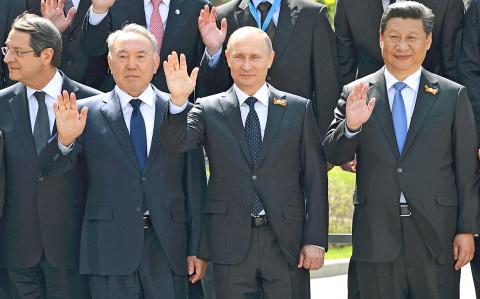China has invited Russian troops to march in a parade in Beijing in September to commemorate the end of World War II, the Chinese Ministry of Defense said yesterday, a move likely to further put off Western leaders from attending.
China has been coy about which nations it plans to invite to the parade, but said it would likely invite representatives from the Western allies who fought with China during the war.
However, Chinese President Xi Jinping (習近平) could be left standing with few top Western officials due to Western governments concerns over a range of issues, including the expected presence of Russian President Vladimir Putin, diplomats said.

Photo: Reuters
Xi on Saturday attended a parade in Moscow to mark 70 years since the end of the war in Europe.
A Chinese Ministry of Defense statement said that Chinese Central Military Commission deputy chairman Fan Changlong (范長龍) told Russian Minister of Defense Sergei Shoigu that China “warmly welcomes Russian military leaders and army formations” to take part in the September events in Beijing.
Xi’s visit to Russia and appearance at the Moscow commemorations “pushed the China-Russia all-round strategic partnership relationship to a new level,” Fan added, according to the statement.
Western leaders boycotted the Moscow parade over Russia’s role in the Ukraine crisis.
The Beijing parade, which is likely see troops marching through Tiananmen Square, is to be Xi’s first since he took over as Chinese Communist Party leader and military chief in late 2012 and as state president in early 2013.
Sino-Japan relations have long been poisoned by what China sees as Japan’s failure to atone for its occupation of parts of the nation before and during the war, and Beijing rarely misses an opportunity to remind its people and the world of this.
Last month, US President Barack Obama’s top Asia adviser, Evan Medeiros, said that he had questions about whether a large military parade would really send a signal of reconciliation or promote healing, drawing a rebuke from China.

NATIONAL SECURITY THREAT: An official said that Guan Guan’s comments had gone beyond the threshold of free speech, as she advocated for the destruction of the ROC China-born media influencer Guan Guan’s (關關) residency permit has been revoked for repeatedly posting pro-China content that threatens national security, the National Immigration Agency said yesterday. Guan Guan has said many controversial things in her videos posted to Douyin (抖音), including “the red flag will soon be painted all over Taiwan” and “Taiwan is an inseparable part of China,” while expressing hope for expedited “reunification.” The agency received multiple reports alleging that Guan Guan had advocated for armed reunification last year. After investigating, the agency last month issued a notice requiring her to appear and account for her actions. Guan Guan appeared as required,

Japan and the Philippines yesterday signed a defense pact that would allow the tax-free provision of ammunition, fuel, food and other necessities when their forces stage joint training to boost deterrence against China’s growing aggression in the region and to bolster their preparation for natural disasters. Japan has faced increasing political, trade and security tensions with China, which was angered by Japanese Prime Minister Sanae Takaichi’s remark that a Chinese attack on Taiwan would be a survival-threatening situation for Japan, triggering a military response. Japan and the Philippines have also had separate territorial conflicts with Beijing in the East and South China

A strong cold air mass is expected to arrive tonight, bringing a change in weather and a drop in temperature, the Central Weather Administration (CWA) said. The coldest time would be early on Thursday morning, with temperatures in some areas dipping as low as 8°C, it said. Daytime highs yesterday were 22°C to 24°C in northern and eastern Taiwan, and about 25°C to 28°C in the central and southern regions, it said. However, nighttime lows would dip to about 15°C to 16°C in central and northern Taiwan as well as the northeast, and 17°C to 19°C elsewhere, it said. Tropical Storm Nokaen, currently

PAPERS, PLEASE: The gang exploited the high value of the passports, selling them at inflated prices to Chinese buyers, who would treat them as ‘invisibility cloaks’ The Yilan District Court has handed four members of a syndicate prison terms ranging from one year and two months to two years and two months for their involvement in a scheme to purchase Taiwanese passports and resell them abroad at a massive markup. A Chinese human smuggling syndicate purchased Taiwanese passports through local criminal networks, exploiting the passports’ visa-free travel privileges to turn a profit of more than 20 times the original price, the court said. Such criminal organizations enable people to impersonate Taiwanese when entering and exiting Taiwan and other countries, undermining social order and the credibility of the nation’s